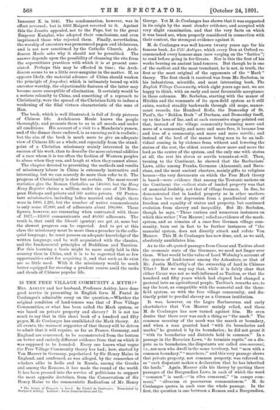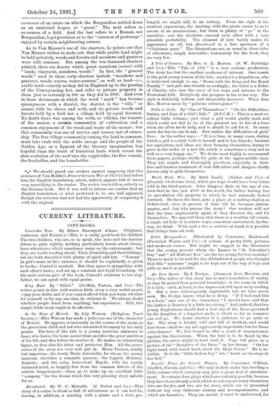IS THE FREE VILLAGE COMMUNITY A MYTH?* Mas. ASHLEY and
her husband, Professor Ashley, have done good service in presenting in English form M. Fustel de Coulanges's admirable essay on the question, Whether the original condition of land-tenure was that of Free Village Communities, or what has been called the Mark system, or was based on private property and slavery ? It is not too much to say that in this short book of a hundred and fifty -pages, M. de Coulanges has annihilated the Mark theory. At all events, the warmest supporter of that theory will be driven to admit that it will require, so far as France, Germany, and England are concerned, to be reconstructed from the bottom on better and entirely different evidence from that on which it was supposed to be founded. Every one knows what vogue the Free Village Community theory has had; how, started by Von Maurer in Germany, popularised by Sir Henry Maine in England, and confirmed, as was alleged, by the researches of .scholars alike in India and in Russia, among the Greeks and among the Romans, it has made the round of the world. It has been pressed into the service of politicians to support the most opposite doctrines, from the Conservatism of Sir Henry Maine to the communistic Radicalism of Mr. Henry • Tho Origin of Property in Land. By Fustel de Coral:rages. Translated by Margaret Ashley. London : Swan Sonnensehein and Co. George. Yet M. de Coulanges has shown that it was supported in its origin by the most slender evidence, and accepted with very slight examination, and that the very facts on which it was based are, when properly considered in connection with their context, the strongest evidence against it.
M. de Coulanges was well known -twenty years ago for his famous book, La Citg Antique, which every Don at Oxford re- commended every honour-man (now verging on the "forties ") to read before going in for Greats. Nor is this the first of his works bearing on ancient land-tenures. But though he is one of the earliest and the most trenchant, he is not, in truth, the first or the most original of the opponents of the " Mark " theory. The first check it received was from Mr. Seebohm, in his industrious, scientific, and most interesting book, The English Village Community, which eight years ago met, we are happy to think, with an early and most favourable acceptance in these columns. Mr. Seebohm, starting with the manor of Hitchin and the remnants of its open-field system as it still exists, worked steadily backwards through old maps, manor- court records, the Hundred Rolla, the Domesday of St. Paul's, the " Boldon Book " of Durham, and Domesday itself, up to the laws of Ine, and at each successive stage pointed out that, instead of the village community becoming more and more of a community, and more and more free, it became less and less of a community, and more and more servile ; and instead of the lord of the manor being seen to be an indi- vidual coming in by violence from without and lowering the status of the rest, the oldest records show more and more the lord as the centre of the system, and the only one with status at all, the rest his slaves or servile tenants-at-will. Then, turning to the Continent, he showed that the Barbarians Laws, alike among Franks, Germans (Alamanni), and Bava- rians, and the most ancient charters, mainly gifts to religious houses—the very documents on which the Free Mark theory is based—were evidence that among the Teutonic nations on the Continent the earliest state of landed property was that of manorial lordship, not that of village freemen. In fine, he demonstrated that in landed property as in other matters, there has been not depression from a paradisaical state of freedom and equality of status and property, but continued evolution from slavery and inequality. But Mr. Seebohm, though he says, " These curious and numerous instances on which this writer [Von Maurer] relied as evidence of the mark- system, and as remains of a once free German village com- munity, turn out in fact to be further instances of "the manorial system, does not directly attack and refute Von Maurer. This M. de Coulanges has now done, and, as we said, absolutely annihilates him.
As to the oft-quoted passages from Cmsar and Tacitus about the economic state of the Germans, we need not linger over them. What world be the value of Lord Wolseley's account of the system of land-tenure among the Ashantees, or that of Mr. Justin McCarthy's of the ownership of land in Chinese Tibet ? But we may say that, while it is fairly clear that either Caesar was not so well-informed as Tacitus, or that the hundred and fifty years which had elapsed had changed a pastoral into an agricultural people, Tacitus's remarks are, to say the least, as compatible with the manorial and the three- field system, as with the free village community, and dis- tinctly point to prndial slavery as a German institution.
It was, however, on the Leges Barbarorum and early chartularies that Von Maurer mainly relied, and these M. de Coulanges has now turned against him. He even denies that there ever was such a thing as " the mark." The common meaning of the mark was the march or boundary, and when a man granted land " with its boundaries and marks," he granted it by its boundaries ; he did not grant it "with its boundaries and districts held in common." In a passage in the Bavarian Laws, " de terminis ruptis," on a dis- pute as to boundaries, the disputants are called com-marcani, i.e., not men who dwell in the same territory, but " men with a common boundary," " marchers ;" and this very passage shows that private property, not common property, was referred to, as " each disputant makes a declaration that he has inherited the lands." Again, Maurer aids his theory by quoting three passages of the Burgundian Laws, in each of which the word " common " is used,—" in silva communi," "in campo com- muni," " silvarum et pascuarum communionem." M. de Coulanges quotes in each case the whole passage. In the first, the question is one between a Roman and a Burgundian, co-owners of an estate on which the Burgundian settled down as an uninvited hospes, or " guest." The next refers to co-owners of a field. And the last refers to a Roman, not Burgundian, legal provision as to the " common of pasturage " -enjoyed by certain neighbouring owners.
As to Von Maurer's use of the charters, he points out that Von Maurer wishes to make out that while arable land might be held privately, woods and forests and meadows and pastures were still 'common. But among the ten thousand charters printed, there are dozens which grant mansions (mansi) with " lands, vineyards, meadows, woods." In fact, the " general words " used in these early charters include " meadows and pastures, woods, waters, water-courses," as well as land—i.e., arable land—exactly as they did in England up to the passing -of the Conveyancing Act, and refer to private property in them just as certainly in 800 as they did in 1800. And even in those documents in which the word " mark " has become synonymous with a district, the district is the " villa " or manor, with its slaves and serfs, and its private woods and forests held by a lord, not a village held by equal freemen. No doubt there was among the serfs, or villeins, the tenants of the manor, a certain community of cultivation, and a common enjoyment of the wood and waste of the manor ; but that community was one of service and tenure, not of owner- ship. The free village community owning the land in common, must take rank with the noble savage and the people of the Golden Age, as a figment of the literary imagination less hopeful than the truth of historical facts which reveal the slow evolution of the serf into the copyholder, the free tenant, the freeholder, and the leaseholder.



































 Previous page
Previous page